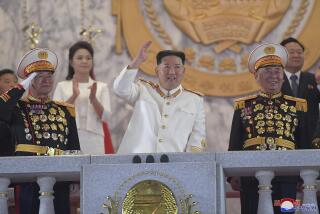South Korea, China Forge Official Ties : Diplomacy: Action increases pressure on North Korea to ease hard-line policies. Roh plans visit to Beijing.
- Share via
BEIJING — China and South Korea formally established diplomatic ties today, ending decades of hostility, and announced that South Korean President Roh Tae Woo will visit Beijing “in the near future.”
The new Seoul-Beijing link is part of a post-Cold War realignment that leaves North Korea’s increasingly isolated Communist government under growing pressure to revise its hard-line domestic and international policies.
Roh, in a nationwide television address today, said China has pledged to play a “positive” role in helping resolve concerns over North Korean nuclear weapons development and to work toward reunification of the rival Koreas.
Chinese Foreign Minister Qian Qichen, speaking Sunday with visiting South Korean Foreign Minister Lee Sang Ok, said that normalization of ties “is good for the people of the two countries and will contribute to peace and prosperity of the world.”
China has not made any public reassessment of its role in the 1950-53 Korean War. But South Korean newspapers on Sunday quoted officials in Seoul as saying that China has described its entry into the war as “unfortunate and regrettable.” The war began when North Korean forces invaded the south, but Chinese troops later fought alongside the North Koreans against South Korean and U.N. forces.
Rapprochement should boost economic ties that are already booming. Two-way trade exceeded $5.8 billion last year and is expected to top $10 billion this year. Roh’s visit , further promoting this trend, is planned for October, according to reports from Seoul.
Seoul’s recognition of Beijing is a diplomatic setback for the Nationalist government in Taipei, which fled to Taiwan in 1949 after losing to the Communists in a civil war on mainland China. Since then, both Taipei and Beijing have claimed to be the government of all China.
In today’s joint communique, South Korea recognized Beijing as “the sole legal government of China” and said it “respects the position of the Chinese side that . . . Taiwan is part of China.”
Seoul’s decision thus requires a break in relations with Taipei. Roh said South Korea will maintain unofficial ties with Taiwan “at the highest possible level.”
Taiwan’s ambassador to South Korea, Charles Shu-chi King, gave a bitter press conference Saturday criticizing the South Korean government for not giving more advance notice of its decision.
“It was like killing somebody and explaining the reason later,” King declared.
Taiwan’s embassy in downtown Seoul, valued at $200 million, is its most valuable diplomatic property overseas. The property was originally purchased by the Qing Dynasty, which collapsed in 1911 and was replaced by the Nationalist government. The embassy will now be turned over to Beijing’s control, according to reports from Seoul.
A History of Seoul-Beijing Relations
Highlights of South Korean-Chinese relations and the region’s history. 1945: Korean Peninsula is divided at end of World War II.
1948: South Korea forms independent capitalist government.
1950-53: Chinese troops fight alongside North Korea against South Korea and the U.S.-led U.N. Command in Korean War.
1953: China signs the armistice ending the war.
May, 1983: First government contact between Seoul, Beijing; for return of hijacked Chinese civilian plane that landed in South Korea.
July, 1988: South Korean President Roh Tae Woo says Seoul will normalize relations with all socialist and Communist allies of rival North Korea to ease tensions and expand trade.
October, 1988: Seoul lifts ban on travel to China.
January, 1991: State-owned Korea Trade Promotion Corp. opens office in Beijing with ambassador-level official as its head.
June, 1991: China opens trade office in Seoul.
October, 1991: Foreign ministers hold first official meeting in New York to discuss bilateral cooperation.
November, 1991: Chinese Foreign Minister Qian Qichen visits Seoul for international conference and pays call on Roh.
February, 1992: Bilateral trade pact goes into effect.
Aug. 24, 1992: South Korea and China establish diplomatic ties.
More to Read
Sign up for Essential California
The most important California stories and recommendations in your inbox every morning.
You may occasionally receive promotional content from the Los Angeles Times.













